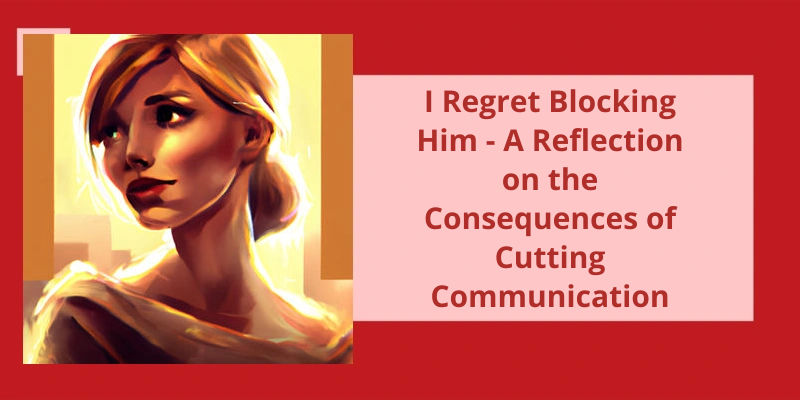Sharing things, whether it be personal experiences, emotions, or thoughts, is a fundamental aspect of human communication and connection. It allows us to express ourselves, seek support, and forge deeper bonds with others. However, sometimes the act of sharing can leave us with a lingering sense of regret. We find ourselves pondering why we opened up, doubting our choices, and questioning the consequences of our vulnerability. But what lies at the core of this regret? What’re the secrets behind our reluctance to share? Is it fear of judgment, betrayal, or rejection? Or perhaps it’s the realization that our vulnerability can be used against us? In this exploration of regret, we will unravel the intricacies of why individuals often regret sharing their innermost thoughts and experiences. From the fear of vulnerability to the pain of betrayal, we will delve into the psychological, emotional, and societal factors that contribute to this sense of remorse.
Why Do You Share Your Secrets With Others?
When we share our secrets with others, it can serve as a form of catharsis. By verbalizing our secrets, we release pent-up emotions and thoughts that may be causing us distress. This act of disclosure can provide a sense of relief and liberation, allowing us to unload the burden weve been carrying in our hearts and minds.
Furthermore, sharing secrets can be seen as an attempt to gain validation and support from others. It’s human nature to seek connection and empathy, and by sharing our secrets, we may hope to receive understanding and reassurance. When others respond positively and offer their support, it can strengthen our relationships and make us feel less alone in our experiences.
By voluntarily revealing our secrets, we take ownership of the information and the power to decide who knows about it. It shifts the control away from potential threats or those who may use the secret against us, giving us a sense of empowerment.
Constantly thinking about the secret can be mentally exhausting and emotionally draining. By sharing it with someone we trust, we no longer have to bear the burden of carrying the secret alone. It reduces the anxiety associated with hiding information and allows us to focus on other aspects of our lives.
However, the act of sharing secrets isn’t always without consequences. Regret can arise when we feel that we’ve revealed too much or shared something that we later wish we hadnt. It may stem from fear of judgment, betrayal, or the potential negative outcomes that could arise from disclosing sensitive information. This regret can be a reminder of the vulnerability we experienced in opening up and a lesson for future decisions about what to share and with whom.
It’s no secret that being vulnerable and sharing personal details with others can lead to a deeper connection. However, if you find yourself constantly regretting oversharing, it may be time to take a step back and evaluate your friendships. While craving intimacy is natural, it’s important to understand that not everyone is equipped to handle such honesty. By assessing the reliability and trustworthiness of your friends, you can find a balance between sharing your thoughts and protecting your emotional well-being.
Why Do I Always Regret Oversharing?
Why do I always regret oversharing? If youre regretful afterward, you may be telling too much, possibly because you crave deeper relationships. The trouble is, oversharing can cause others to clam up. Opening up and sharing personal details can be cathartic, but it’s essential to assess the situation and the people involved before divulging too much information.
Are you seeking validation, attention, or a deeper connection with someone? Recognizing these underlying desires can help you work towards a healthier way of expressing yourself.
It’s important to remember that not everyone can handle or reciprocate the level of openness you desire. Take stock of your friends and acquaintances, and evaluate how trustworthy and supportive they are. This evaluation can help you identify those who can provide the depth of understanding and support you seek.
Oversharing can lead to unintended consequences, such as others feeling overwhelmed or uncomfortable. People may become hesitant to share their own experiences or thoughts, fearing that they’ll be met with judgment or an expectation of reciprocation. Recognizing the boundaries of others comfort levels is crucial for maintaining healthy relationships.
Learning to gauge the appropriate level of sharing in different situations can help prevent future regrets. Take the time to consider the context, the individuals involved, and the potential consequences before opening up. It’s often better to start with small disclosures and gradually build trust and intimacy over time. This measured approach allows others to reciprocate at a pace that feels comfortable to them.
Source: I feel guilty for oversharing, how do I get over it?
According to Ward, sharing secrets is often viewed as a way to establish trust and create a sense of closeness between individuals. In fact, it can act as a powerful tool in determining who’s likely to build strong relationships and who may be missing out on opportunities to foster trust and closeness.
Does Sharing Secrets Make People Closer?
Why do some people regret sharing things and feel a sense of remorse afterward? There are several underlying reasons behind this phenomenon. First and foremost, the act of sharing a secret can leave individuals feeling vulnerable and exposed. They may worry about how others will perceive them or fear judgment and criticism. In some cases, the fear of losing control over the information shared can lead to regret. Once a secret is out, it can’t be taken back, and this loss of control can be distressing.
They may have anticipated empathy and validation, but instead encountered dismissive responses or invalidation. This disappointment can lead to feelings of regret and a reluctance to share further.
Being mindful of ones own boundaries and discerning whom to trust with sensitive information can help prevent future regrets. Ultimately, the decision to share or withhold secrets should be based on individual comfort levels and a realistic assessment of the potential outcomes.
Additionally, practicing mindfulness and being present in the moment can help you redirect your thoughts and prevent them from getting consumed by regrets. Engaging in activities that bring you joy and fulfillment, such as hobbies or self-care practices, can also serve as effective distractions. Remember, the key is to actively shift your focus away from your regrets and towards more positive and productive aspects of your life.
How Do You Not Think About Something You Regret?
Practice Mindfulness
Mindfulness is all about being present in the moment and fully experiencing what’s happening around you. When you find yourself thinking about something you regret, try to redirect your focus to the present. Pay attention to your surroundings, engage your senses, and take notice of the small details that you may have overlooked before. By practicing mindfulness, you can shift your attention away from the past and alleviate the regretful thoughts that may be weighing you down.
Challenge Negative Thoughts
Regret often stems from negative thoughts and self-blame. To overcome this, challenge those negative thoughts and replace them with more positive and realistic ones. Ask yourself if there was anything you could have done differently or if you actually learned something valuable from the experience. Remind yourself that everyone makes mistakes and that regret is a natural part of life. By reframing your thoughts, you can mitigate the impact of your regrets and start focusing on more constructive and empowering perspectives.
Seek Support
Talking to someone you trust about your regrets can be incredibly helpful. Sharing your thoughts and feelings with a supportive friend or family member can provide you with a fresh perspective and give you the opportunity to gain insight into the situation. They may be able to provide you with guidance or advice that you hadnt considered before. Additionally, simply expressing your regrets can help you release pent-up emotions and find some relief.
Learn from Your Mistakes
Forgive Yourself
Forgiving yourself is an essential step in letting go of regret. Accept that you’re only human and that making mistakes is part of the journey. Holding onto guilt and self-blame will only keep you stuck in a cycle of regret, preventing you from moving forward. Practice self-compassion and remind yourself that everyone deserves forgiveness, including yourself. Treat yourself with kindness and understanding, and allow yourself to heal and grow from your past regrets.
Regretting something youve shared can be a challenging experience, but it’s possible to overcome it. Remember, it’s never too late to make positive changes and create a life that aligns with your values and aspirations.
The Role of Self-Reflection in Healing From Regret
Self-reflection plays a crucial role in the healing process from regret. It involves examining our thoughts, feelings, and actions that led to the regretful experience. By engaging in self-reflection, we gain insight into our motivations, values, and beliefs, which helps us make sense of our regrets.
Through self-reflection, we can identify patterns or behaviors that contributed to the regret, allowing us to learn from our mistakes and make positive changes in the future. It also helps us understand the impact of our actions on others, fostering empathy and guiding us towards taking responsible and thoughtful actions.
Furthermore, self-reflection allows us to forgive ourselves and let go of the negative emotions associated with regret. As we gain a deeper understanding of our regrets, we can redirect our focus towards personal growth and self-improvement, leading to healing and a sense of resilience.
So, self-reflection serves as a valuable tool in navigating through the complex emotions tied to regret, enabling us to move forward and live a more fulfilling life.
Oversharing can be a common occurrence for individuals dealing with social anxiety or insecurity, as they may feel the need to divulge personal information in an attempt to seek validation or acceptance. However, the immediate sense of doubt or regret that follows such oversharing can be a crucial indicator that one recognizes the inappropriateness of their disclosure. It’s important to further explore the underlying reasons behind this behavior in order to address any underlying issues that may be contributing to the cycle of oversharing and subsequent regret.
Why Do I Overshare Then Regret It?
One possible reason for why people overshare and then regret it’s rooted in social anxiety or insecurity. In an attempt to fit in or gain acceptance, individuals may feel compelled to share personal information, often hoping it will create a bond or connection. However, once the information is disclosed, feelings of doubt and regret may arise. This suggests that deep down, these individuals recognize that the information they shared was inappropriate or excessive for the given context.
Oversharing can also be a sign of an underlying tendency to disclose too much in general. Some individuals have a natural inclination to be open and transparent, often without considering the potential consequences. These individuals may not fully grasp the boundaries of appropriate disclosure and inadvertently reveal personal details that should have remained private. The subsequent regret then stems from a realization that they exposed themselves in an unwanted or vulnerable way.
Furthermore, societal pressure can play a role in the oversharing phenomenon. In todays culture, there’s a strong emphasis on authenticity and vulnerability, fueled by the prevalence of social media platforms. This can lead individuals to feel compelled to share more than they’re comfortable with in order to conform to societal standards. However, once the immediate desire for validation or connection dissipates, feelings of regret can surface as they realize the potential consequences of their oversharing.
How to Repair and Rebuild Relationships After Oversharing and Experiencing Regret.
Oversharing can sometimes lead to feelings of regret and damage our relationships with others. To repair and rebuild these relationships, it’s important to acknowledge and take responsibility for our actions. Open and honest communication is key, allowing both parties to express their feelings and concerns. Showing genuine remorse and actively working on rebuilding trust can help mend the relationship. It’s vital to set boundaries and be mindful of what information is shared moving forward. By learning from our mistakes and focusing on strengthening the connection, we can gradually repair the damage caused by oversharing and rebuild the relationship.
It’s natural to feel regret after sharing something personal with someone and realizing that it was a mistake. When this happens, it’s important to navigate the situation with empathy, understanding, and self-compassion. Remember the distinction between guilt and shame, accept the consequences and the potential for change, apologize sincerely, validate the other person’s feelings, and don’t forget to be kind to yourself. Ultimately, use this experience as an opportunity for growth and learn from your mistakes.
What to Do When You Regret Telling Someone Something Personal?
Sharing personal information with someone and later regretting it can be a challenging situation to navigate. It’s important to remember that feelings of regret are natural and common, but it’s also essential to take action to address and resolve these emotions. Here are a few steps you can take when you regret telling someone something personal:
First and foremost, it’s crucial to distinguish between guilt and shame. Guilt is feeling remorse for a specific action or behavior, while shame is a more enduring feeling of unworthiness. Recognizing the difference can help you better understand and address your emotions. Remind yourself that regretting sharing something personal doesn’t make you a bad person, but rather someone who made a mistake.
Acceptance is key when it comes to moving forward. Acknowledge that you can’t change what’s been said. Embrace the reality that things may not go back to the way they were before, but understand that growth and change are part of life. By accepting the situation, you can focus on figuring out the best way to move forward.
Apologizing for what you said and making amends can help repair any damage caused. Take responsibility for your words and express genuine remorse. Be sincere in your apology and open to making things right. Understand that the other person may need time and space to process their feelings, and be patient during this process.
Empathy and validation are essential components of resolving the situation. Put yourself in the other persons shoes and try to understand how they feel. Validate their emotions and let them know that you acknowledge their hurt or discomfort. Show empathy by actively listening and allowing them to express their thoughts and feelings without judgment.
In the midst of addressing the situation with the other person, don’t forget to show yourself kindness. Self-forgiveness is crucial in moving forward from feelings of regret. Remind yourself that making mistakes is part of being human, and use this experience as an opportunity for personal growth and learning. Treat yourself with compassion and practice self-care to help heal any emotional wounds.
Lastly, learn from your mistakes. Reflect on what led you to share something personal in the first place and consider how you can prevent a similar situation from happening in the future. Use this experience as a lesson in setting boundaries and being more mindful of who you share personal information with. Allow yourself to grow and evolve as you navigate through the consequences of sharing something you regret.
How to Rebuild Trust After Sharing Something Personal and Regretting It
- Apologize sincerely for sharing something personal and regretting it
- Acknowledge the impact and hurt caused by your actions
- Take responsibility for your mistake and avoid making excuses
- Listen actively to the feelings and concerns of the person affected
- Show genuine empathy and compassion towards their emotions
- Give them space and time to process their emotions and heal
- Rebuild trust by being consistently transparent and honest
- Respect their boundaries and avoid sharing sensitive information without permission
- Consider seeking therapy or guidance to address the underlying issues
- Be patient and understanding as trust can’t be rebuilt overnight
- Learn from your mistake and commit to personal growth and improvement
Conclusion
In conclusion, the act of regretting sharing things can stem from various underlying reasons, often reflecting our innate need for validation, fear of judgment, or the desire for privacy and self-protection. It’s a complex interplay between our emotions, experiences, and social dynamics that influences our regretful behaviors in sharing certain things. Understanding these secrets behind our regret can serve as a valuable tool in navigating our interactions and relationships, enabling us to make more informed decisions about what we disclose and to whom. By cultivating self-awareness, practicing healthy boundaries, and fostering open communication, we can harness the power of sharing while minimizing potential regrets, ultimately fostering more meaningful connections and personal growth.






